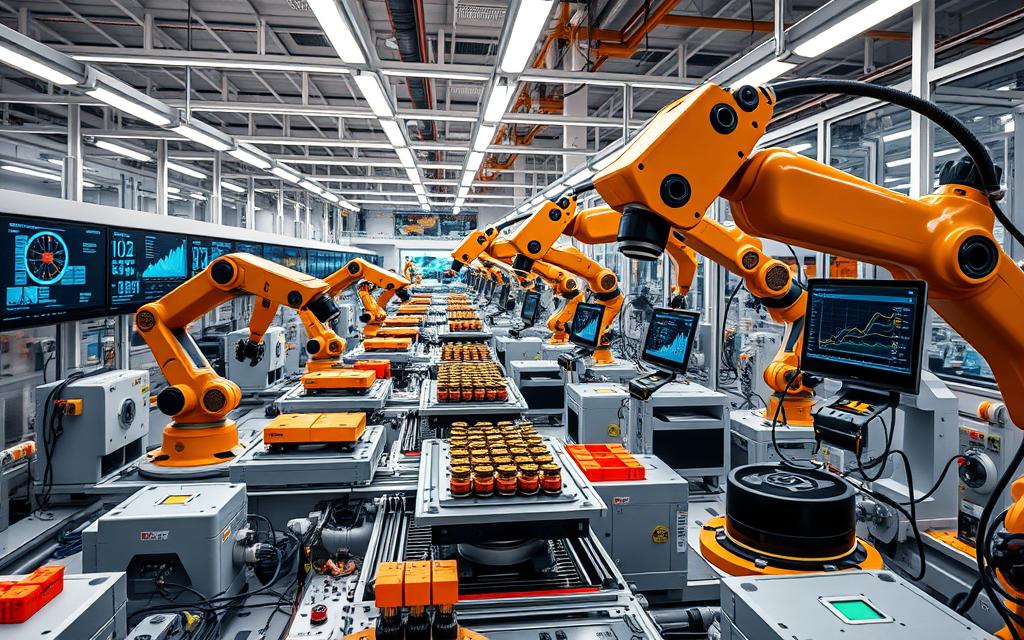In today’s quick world, automation is changing the business scene. It makes things faster and work better with process automation. Big changes in efficiency improvement happen, saving time and improving work quality. Studies say work can get 50% better, showing how big automation’s role is.
Automated systems cut down on mistakes, making the work output better. This saves time and resources that used to fix errors. Jobs that took hours now need just minutes or seconds. This boosts productivity and makes customers happier. Thanks to automation, companies can now plan better for growth. It helps them grow strong and win in the tough market.
For more on how automation helps companies do well, see this helpful guide on scaling businesses with technology.
The Transformative Power of Automation
Today’s businesses are moving fast, and automation is a game changer. It lets companies do more with less, cutting down on manual work. This shift means they can do things better and faster. With automated systems, organisations can focus on bigger, more important projects.
Understanding Process Automation
Automation uses technology to do tasks that people used to do. It makes work faster and cuts mistakes, like when computers handle data or reports. Nearly 90% of workers feel happier in their jobs thanks to automation. It makes them feel more useful and satisfied.
Key Benefits of Automation for Businesses
Automation’s perks are huge and varied:
- Boosted Productivity: More than 90% of employees work better with automation.
- Enhanced Collaboration: About 85% see teamwork improve with these tools.
- Accuracy in Task Execution: Almost 90% rely on automation for error-free work, helping them make better decisions.
- Greater Customer Engagement: 80% have more time for customers thanks to efficient processes.
- Cost Savings: Automation cuts costs a lot, especially in factories where less manual work is needed.
Process automation not only boosts efficiency but also saves money and enhances service quality. It lets businesses quickly adjust and succeed in a changing market.
Enhancing Operational Efficiency
In today’s fast-moving world, being efficient in business is key. Automation plays a big role in this. It helps lower errors and makes processes better. By making repetitive tasks automatic, companies can cut down on mistakes. This boosts their productivity and how well they operate.
Reduction of Human Errors
Automation helps cut down on mistakes by being precise every time. This boost in error minimisation improves what businesses can offer. For example, a big distributor of building products improved order efficiency a lot while cutting errors by 90% after adopting automation.
Faster Turnaround Times
Automation speeds up business processes. Jobs that took a long time now get done quickly. This speed improves work output and makes customers happier. They get quick answers and receive services faster.
By making order handling and supply chain more visible, automation speeds up responses. It allows fast handling of billing and payments. So, companies can spend more time selling and looking after customers. This way, they work more efficiently and respond better to what the market wants.
| Metric | Before Automation | After Automation |
|---|---|---|
| Order Efficiency | 1X | 10X |
| Error Rate | 90% | 9% |
| Customer Satisfaction | Low | High |
| Response Time | Hours | Minutes |
Using automation as a main strategy boosts efficiency and service quality. The aim is to be more accurate and keep customers happy and loyal.
Cost-Effective Solutions for Businesses
In today’s competitive world, companies always look for ways to cut costs and improve their services. By adopting automation, they can save a lot on labour costs and make their processes smoother. This not only reduces operational costs but also helps in using resources more smartly.
Labour Cost Reduction
Automation changes the way tasks are done, especially repetitive ones. It frees up staff to do more valuable work that needs creativity and critical thinking. This shift towards workforce optimisation leads to better innovation and results. It also means businesses can get the best out of their teams and reach their goals more effectively.
Optimisation of Resources
With automated systems, operational efficiency gets a boost. Tasks like managing stock and HR duties are done automatically, reducing costs significantly. This allows companies to focus more on growing their business. By centralising these tasks, everything becomes quicker and more accurate, moving towards more sustainable and effective operations.
| Aspect | Before Automation | After Automation |
|---|---|---|
| Labour Costs | High | Low |
| Operational Efficiency | Moderate | High |
| Time for Strategic Tasks | Limited | Increased |
| Error Rate | High | Low |
| Resource Allocation | Suboptimal | Strategic |
Companies that embrace automation see big improvements. They become more competitive and are better positioned for growth. For deeper insights into how automation enhances business operations, check out more resources here.
How Automation Drives Business Growth and Efficiency
Automation acts as a key player for organisational growth. It changes how companies work, making workflows smooth and improving process efficiency. Businesses see the value in automation for handling more work and boosting productivity. It also helps in enhancing customer relations.
Streamlined Workflows and Processes
Automation helps companies reduce delays, leading to smoother operations. It enhances resource management and staff deployment. Through automation, benefits like better transparency and immediate tracking emerge. Research shows companies using over 50 automated systems grew from 4% to 13%. This growth highlights the move towards more automation for better productivity.
Improved Customer Experiences
Automation is vital in improving customer experience. Automated services offer personalised interactions and quick support, boosting customer loyalty. This approach not only makes customers happier but also brings in referrals. With 79% of leaders expecting big gains from AI and automation, focusing on customer relationships is key.
Scalability to Manage Increased Demand
For growing businesses, dealing with more demand requires scalability. Automation provides the necessary tools for handling increased workload without losing quality. Platforms like Adobe Workfront and monday.com show how automation simplifies tasks and supports growth. This way, companies can meet ambitious growth goals with fewer resources.
| Benefits of Automation | Impact on Businesses |
|---|---|
| Increased Productivity | Enhances employee satisfaction by reducing manual tasks |
| Cost Savings | Lower operational costs through reduced manual interventions |
| Quick Turnaround Times | Improves speed of service delivery |
| Better Use of Employee Time | Enables focus on creative and strategic initiatives |
| Competitive Advantage | Positions businesses ahead of trends and market demands |
Explore more about technologies changing business at key technologies transforming modern business operations.
Data-Driven Decision Making
In today’s world, data drives decisions in businesses. They use it to guide their growth and strategies. Automation is key, helping to use analytics for valuable insights. This way, businesses can quickly get and use a lot of information. They make decisions that help them grow.
Leveraging Analytics for Growth
Startups are using automation like web scraping, APIs, and IoT to understand data better. Web scraping gets lots of data from websites fast. APIs make it easier to work with different data sources. IoT devices check operational data in real time. This helps companies stay up-to-date with market changes.
Identifying Trends and Opportunities
With automated analytics, startups spot important trends and data links. This helps them find new opportunities. They can tailor their marketing, adjust prices, and serve customers better based on solid data. This makes them more efficient and able to grow. It also helps them handle complex technical issues and privacy matters.
Effective Collaboration and Communication
In today’s fast-paced business world, good collaboration and communication are key to success. Automation helps a lot by providing central places for teams to work together. With different tools, team members can easily talk to each other, no matter where they are.
Centralised Platforms for Teamwork
Using central places for work brings everyone together by keeping info and resources in one spot. Tools like Slack, Microsoft Teams, and Basecamp help teams talk, share files, and keep track of progress. This makes working on tasks easy and helps organisations talk better.
Automated Notifications and Updates
Automated updates change how teams keep up with project news. Notification systems in tools like Trello and Asana make sure everyone knows about deadlines and changes. Automation takes away the chore of constant updates, letting team members focus on their work and boosting productivity.
| Feature | Centralised Platforms | Automated Updates |
|---|---|---|
| Purpose | Enhance teamwork through shared resources | Keep teams informed automatically |
| Examples | Slack, Microsoft Teams | Trello, Asana |
| Benefits | Improved communication efficiency | Reduced manual oversight and errors |
| Impact on Workflow | Streamlined task management | Enhanced productivity |
By using these new tools, businesses can deal with the challenges of working from different places. Mixing automation with better communication tools means organisations can work better together. They can also reach their goals more easily.
Conclusion
Business automation is a key player in boosting growth and improving how things run. It opens new paths to success and more work getting done. Studies, like one from McKinsey & Company, show that automation could make work up to 30% more productive. Also, the World Economic Forum found that costs for labour could drop by up to 70% in certain areas.
Automation’s impact on the future of jobs is huge. It means doing things with fewer mistakes, as PwC’s findings suggest a drop in errors by up to 95%. Not just saving money, but also pushing for more new ideas. The International Federation of Robotics says innovation could get a 60% boost from automation. For firms looking to be top-notch, getting into these tech improvements is vital for beating the competition.
Dealing with workers not being into their jobs costs companies around $300 billion each year. Automation stands out as a solution to this big problem. It takes over boring jobs, which helps firms face future needs and keeps employees driven. For those keen on learning how AI is changing the business scene, check out this informative article.
FAQ
What is automation and how does it benefit businesses?
Automation is using technology to do tasks usually done by people. It makes businesses run smoother, more accurate, and productive. By doing repetitive work, it saves time and cuts mistakes, leading to cost savings and better performance.
Can automation help reduce operational costs?
Yes, automation cuts operational costs by lowering labour expenses. It lets businesses use their workforce better and push for innovation. This smart use of human resources helps the business grow strategically.
How does automation enhance customer satisfaction?
Automation improves customer happiness by speeding up services and offering customised interactions. It gives quick answers to customer questions, ensuring they get help right away. This builds loyalty and leads to positive word-of-mouth.
What are the key advantages of implementing process automation?
Process automation brings many benefits, like better operational performance and higher accuracy. It ensures tasks are done the same way, cuts down on mistakes, and handles more work with ease. Adopting this tech allows businesses to focus on growing and reaching their goals.
How can automation contribute to data-driven decision making?
Automation helps with data-driven decisions by using tools that analyze customer behavior and market trends. With all the data in one place, companies can spot trends and opportunities faster. This lets them adjust their strategies to stay ahead in the market.
What role do automated notifications play in team collaboration?
Automated notifications help teams stay up to date on projects and deadlines, making working together easier. This keeps everyone on target with the company’s goals and improves how well everyone communicates. It tracks tasks well without needing to check in all the time.
How does automation improve resource management?
Automation makes managing resources better by smoothing out processes in different areas. It handles tasks like keeping stock and HR matters efficiently, cutting down on costs. This allows companies to put more into projects that will help them grow.


















